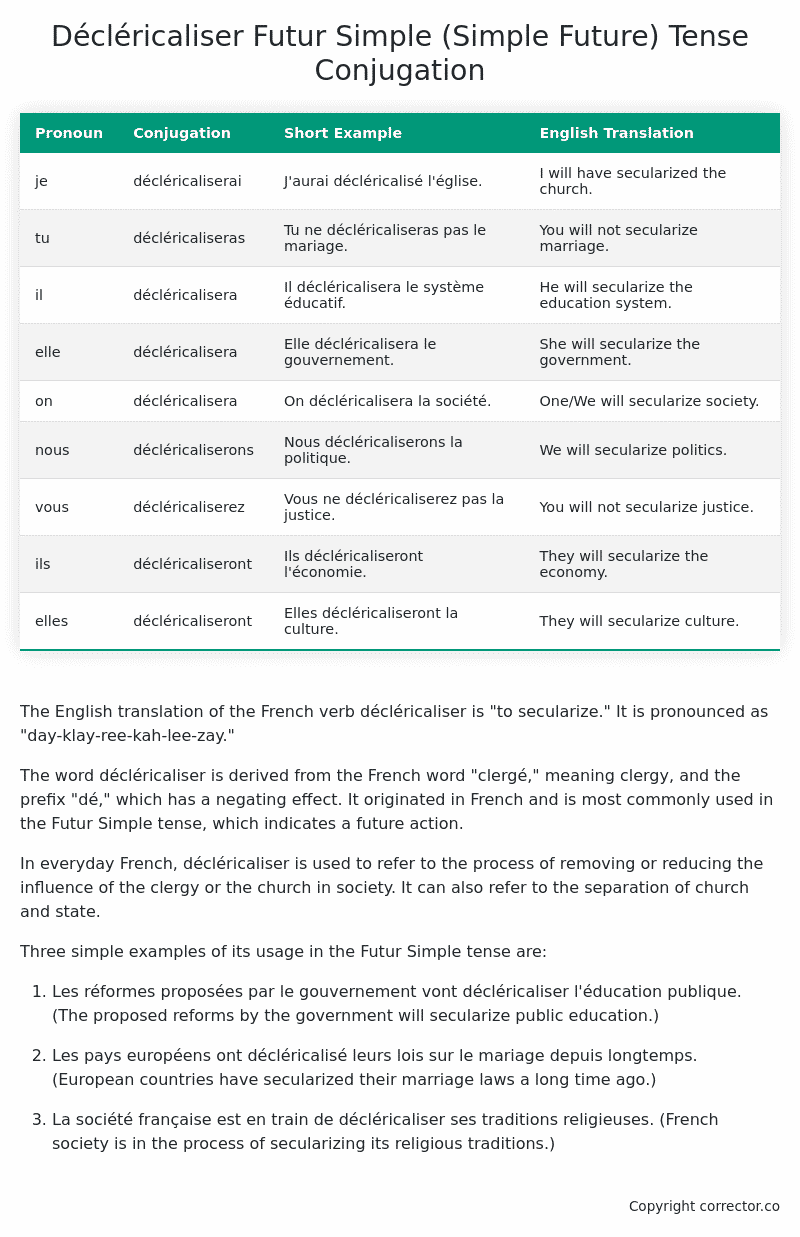Futur Simple (Simple Future) Tense Conjugation of the French Verb décléricaliser
Introduction to the verb décléricaliser
The English translation of the French verb décléricaliser is “to secularize.” It is pronounced as “day-klay-ree-kah-lee-zay.”
The word décléricaliser is derived from the French word “clergé,” meaning clergy, and the prefix “dé,” which has a negating effect. It originated in French and is most commonly used in the Futur Simple tense, which indicates a future action.
In everyday French, décléricaliser is used to refer to the process of removing or reducing the influence of the clergy or the church in society. It can also refer to the separation of church and state.
Three simple examples of its usage in the Futur Simple tense are:
-
Les réformes proposées par le gouvernement vont décléricaliser l’éducation publique. (The proposed reforms by the government will secularize public education.)
-
Les pays européens ont décléricalisé leurs lois sur le mariage depuis longtemps. (European countries have secularized their marriage laws a long time ago.)
-
La société française est en train de décléricaliser ses traditions religieuses. (French society is in the process of secularizing its religious traditions.)
Table of the Futur Simple (Simple Future) Tense Conjugation of décléricaliser
| Pronoun | Conjugation | Short Example | English Translation |
|---|---|---|---|
| je | décléricaliserai | J’aurai décléricalisé l’église. | I will have secularized the church. |
| tu | décléricaliseras | Tu ne décléricaliseras pas le mariage. | You will not secularize marriage. |
| il | décléricalisera | Il décléricalisera le système éducatif. | He will secularize the education system. |
| elle | décléricalisera | Elle décléricalisera le gouvernement. | She will secularize the government. |
| on | décléricalisera | On décléricalisera la société. | One/We will secularize society. |
| nous | décléricaliserons | Nous décléricaliserons la politique. | We will secularize politics. |
| vous | décléricaliserez | Vous ne décléricaliserez pas la justice. | You will not secularize justice. |
| ils | décléricaliseront | Ils décléricaliseront l’économie. | They will secularize the economy. |
| elles | décléricaliseront | Elles décléricaliseront la culture. | They will secularize culture. |
Other Conjugations for Décléricaliser.
Le Present (Present Tense) Conjugation of the French Verb décléricaliser
Imparfait (Imperfect) Tense Conjugation of the French Verb décléricaliser
Passé Simple (Simple Past) Tense Conjugation of the French Verb décléricaliser
Passé Composé (Present Perfect) Tense Conjugation of the French Verb décléricaliser
Futur Simple (Simple Future) Tense Conjugation of the French Verb décléricaliser (this article)
Futur Proche (Near Future) Tense Conjugation of the French Verb décléricaliser
Plus-que-parfait (Pluperfect) Tense Conjugation of the French Verb décléricaliser
Passé Antérieur (Past Anterior) Tense Conjugation of the French Verb décléricaliser
Futur Antérieur (Future Anterior) Tense Conjugation of the French Verb décléricaliser
Subjonctif Présent (Subjunctive Present) Tense Conjugation of the French Verb décléricaliser
Subjonctif Passé (Subjunctive Past) Tense Conjugation of the French Verb décléricaliser
Subjonctif Imparfait (Subjunctive Imperfect) Tense Conjugation of the French Verb décléricaliser
Conditionnel Présent (Conditional Present) Tense Conjugation of the French Verb décléricaliser
Conditionnel Passé (Conditional Past) Tense Conjugation of the French Verb décléricaliser
L’impératif Présent (Imperative Present) Tense Conjugation of the French Verb décléricaliser
L’infinitif Présent (Infinitive Present) Tense Conjugation of the French Verb décléricaliser
Struggling with French verbs or the language in general? Why not use our free French Grammar Checker – no registration required!
Get a FREE Download Study Sheet of this Conjugation 🔥
Simply right click the image below, click “save image” and get your free reference for the décléricaliser Futur Simple tense conjugation!

Décléricaliser – About the French Futur Simple (Simple Future) Tense
Formation of Futur Simple
For regular -er verbs (e.g., parler – to speak)
For regular -ir verbs (e.g., finir – to finish)
For regular -re verbs (e.g., vendre – to sell)
Common Everyday Usage Patterns
Conditional Statements
Interactions with Other Tenses
Futur Antérieur
Conditional
Present
Summary
I hope you enjoyed this article on the verb décléricaliser. Still in a learning mood? Check out another TOTALLY random French verb conjugation!


